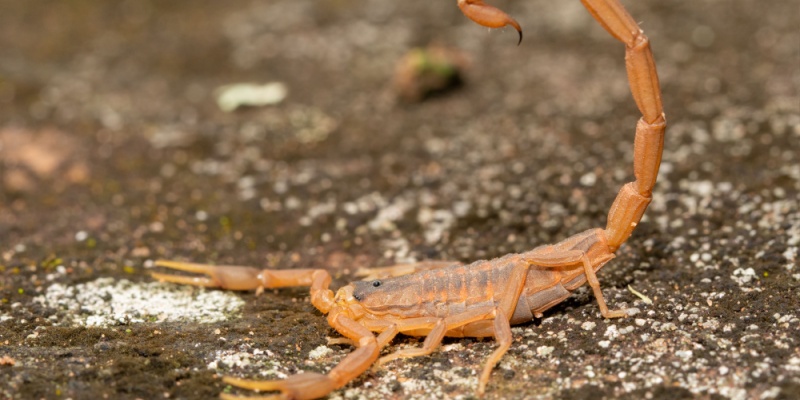Living in Las Vegas means sharing our desert environment with scorpions. While encounters can often be avoided with proper prevention, stings do occasionally occur. At Pest Raiders, we believe that knowledge is your best defense when dealing with scorpion stings. This guide will help you understand how to respond appropriately if you or a family member experiences a scorpion sting in Las Vegas.
Understanding Scorpion Stings
Scorpions use their stinger—located at the end of their tail—to deliver venom primarily for hunting prey and self-defense. In Las Vegas, most scorpion stings occur when the scorpion is accidentally disturbed or feels threatened, such as when:
- Putting on shoes or clothing where a scorpion is hiding
- Moving stored items in garages or storage areas
- Reaching into dark spaces without checking first
- Walking barefoot at night
- Gardening without gloves
Symptoms of Scorpion Stings
Scorpion sting symptoms vary considerably based on the species involved and the individual's sensitivity. Here's what to expect from stings from different Las Vegas scorpion species:
Bark Scorpion Stings (Most Severe)
- Immediate, intense pain often described as burning
- Numbness and tingling that may spread beyond the sting site
- Hypersensitivity around the sting area
- Possible difficulty swallowing or slurred speech
- Muscle twitching or jerking
- Restlessness and anxiety
- Increased heart rate and blood pressure
- Respiratory difficulties (in severe cases)
- Excessive salivation or foaming at the mouth (rare)
Other Las Vegas Scorpion Species (Generally Less Severe)
- Localized pain and burning sensation
- Mild swelling and redness
- Slight numbness around the sting site
- Itching during healing
- Symptoms typically resolve within a few hours
Immediate First Aid for Scorpion Stings
If a scorpion sting occurs, take these immediate steps:
- Remain calm Anxiety increases heart rate, potentially accelerating venom circulation
- Wash the area with mild soap and water
- Apply a cold compress to the sting site (avoid ice directly on skin)
- Elevate the affected limb to approximately heart level
- Remove jewelry or tight items near the sting site in case swelling occurs
- Take a photo of the scorpion if possible (for species identification)
- Monitor symptoms closely for the first 2-3 hours
When to Seek Emergency Medical Care
Seek immediate medical attention if any of these situations apply:
High-Risk Individuals
- The person stung is a child under 6 years old
- The person stung is elderly (over 65)
- The person has a compromised immune system
- The person has known allergies to insect stings
- The person is pregnant
Concerning Symptoms
- Difficulty breathing or swallowing
- Uncontrolled muscle movements or seizures
- Slurred speech or vision problems
- Excessive drooling
- Severe swelling that spreads rapidly
- Hives or rash developing away from the sting site
- Nausea and vomiting that persists
- Elevated heart rate that doesn't normalize
Other Considerations
- Multiple stings
- Sting to the face, neck, or near the eyes
- Uncertain scorpion species (particularly if it could be a bark scorpion)
- Previous severe reaction to scorpion stings
Medical Treatment for Scorpion Stings
When medical care is needed, treatments may include:
For Severe Reactions (Typically Bark Scorpion)
- Antivenom (Anascorp) for severe bark scorpion envenomations
- Pain management medications
- Anti-seizure medications if needed
- IV fluids and supportive care
- Monitoring of vital signs and respiratory function
For Moderate to Mild Reactions
- Pain relievers (acetaminophen or ibuprofen)
- Antihistamines to reduce itching
- Tetanus booster if needed
- Observation for developing symptoms
Home Care for Mild Sting Reactions
For mild stings from less venomous species (when medical care isn't needed):
- Continue applying cold compresses intermittently
- Take over-the-counter pain relievers as directed
- Keep the area clean and monitor for signs of infection
- Avoid scratching the sting site
- Rest and limit activity of the affected limb
Preventing Future Scorpion Stings
After experiencing a scorpion sting, taking preventative measures is crucial:
- Inspect your home thoroughly for potential entry points
- Contact professional pest control for comprehensive scorpion management
- Adopt preventative habits like shaking out shoes before wearing and checking bedding
- Eliminate harborage areas around your property
- Consider regular preventative treatments around your home's perimeter
Las Vegas Scorpion Safety Resources
In Las Vegas, residents should program these numbers into their phones:
- Poison Control Center: 1-800-222-1222
- Emergency Services: 911
Professional Scorpion Control with Pest Raiders
If you've experienced a scorpion sting at your Las Vegas property, it indicates favorable conditions for scorpions that should be addressed. At Pest Raiders, we provide:
- Comprehensive scorpion inspections
- Identification of scorpion species on your property
- Customized treatment plans targeting the specific species
- Preventative measures to reduce future risks
- Ongoing monitoring and maintenance plans
Don't wait until another painful encounter occurs. Contact Pest Raiders today for expert scorpion control services that protect your family from these venomous Las Vegas pests.
